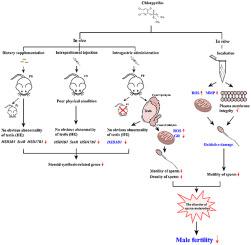Environmental Research ( IF 8.3 ) Pub Date : 2020-06-21 , DOI: 10.1016/j.envres.2020.109785 Xuelian Zhang 1 , Wenbo Cui 1 , Ke Wang 1 , Rui Chen 1 , Mingyue Chen 1 , Kangshu Lan 2 , Yanpei Wei 1 , Chuanying Pan 1 , Xianyong Lan 1

|
Background
Pesticides, especially organophosphorus pesticides such as chlorpyrifos (CPF), play an important role in modern agriculture. Studies have shown that pesticide residues are an important cause of male reproductive injury in mammal.
Aim
The aim of this study was to evaluate the reproductive damage caused by CPF in male mice and investigate the underlying mechanisms.
Methods
In vivo, C57BL/6 mice (6–8 weeks old) were treated with CPF for 14, 70, and 80 days by intraperitoneal injection, intragastric administration, and dietary supplementation, respectively. Then, sperm from the cauda epididymidis was cultured in vitro to confirm the deleterious effects of CPF.
Results
The in vivo results indicated that, after treatment with CPF by dietary supplementation and intraperitoneal injection, the expression of reproduction-related genes in the mouse testes was altered, although the mice were fertile and the testes presented no morphological abnormalities. Notably, mating experiments revealed that the fertility of male mice was decreased following CPF administration by gavage. Sperm motility within the cauda epididymidis declined significantly after CPF treatment, which was accompanied by a decrease in sperm density, upregulation of relative reactive oxygen species (ROS) levels, and downregulation of glutathione reductase activity. In vitro incubation experiments showed that sperm rapidly lost their capacity for linear movement; the relative ROS levels also increased significantly, while the mitochondrial membrane potential (MMP) showed a significant decrease. However, the integrity of the plasma membrane was not affected by CPF administration.
Conclusions
The above data indicated that exposure to CPF reduces sperm motility by disrupting mitochondrial function and increasing the level of oxidative stress during sperm maturation, thereby reducing the fecundity of male mice.
中文翻译:

毒死rif抑制精子成熟,并导致小鼠雄性生育力下降。
背景
农药,尤其是有机磷农药,如毒死rif(CPF),在现代农业中起着重要作用。研究表明,农药残留是哺乳动物男性生殖损伤的重要原因。
目标
这项研究的目的是评估雄性小鼠由CPF引起的生殖损伤并研究其潜在机制。
方法
在体内,分别通过腹膜内注射,胃内给药和饮食补充对C57BL / 6小鼠(6-8周大)进行了CPF处理14天,70天和80天。然后,对附睾马尾精子进行体外培养,以确认CPF的有害作用。
结果
该体内结果表明,与CPF治疗通过饮食补充和腹膜内注射后,在小鼠睾丸再生相关基因的表达被改变,虽然小鼠肥沃,睾丸呈现无形态学异常。值得注意的是,交配实验表明,通过强饲法给予CPF后,雄性小鼠的生育能力下降。CPF处理后,附睾马尾内的精子运动能力显着下降,同时精子密度降低,相对活性氧(ROS)水平上调和谷胱甘肽还原酶活性下调。体外孵育实验表明,精子迅速丧失了线性运动能力。相对ROS水平也显着增加,而线粒体膜电位(MMP)显示出显着降低。但是,CPF给药不会影响质膜的完整性。
结论
以上数据表明,暴露于CPF会通过破坏线粒体功能并增加精子成熟过程中的氧化应激水平而降低精子活力,从而降低雄性小鼠的繁殖力。


























 京公网安备 11010802027423号
京公网安备 11010802027423号